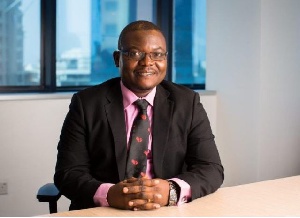 Gayheart Mensah, External Affairs Director at Vodafone Ghana
Gayheart Mensah, External Affairs Director at Vodafone Ghana
Gayheart Mensah, External Affairs Director at Vodafone Ghana has warned that if the telecoms sector is not equitably regulated, the sector risk total collapse as players continues to fight for survival.
In a media interaction with bloggers, journalists and videographers, Mr. Mensah took great pain to unravel the difficult terrain the telcos find themselves with some making losses.
On Vodafone’s efforts to secure a 4g spectrum, he noted his company has made a bid at the second opening of bids and are awaiting the regulators’ approval.
“It’s dangerous for the regulator to sell the 4g spectrum to the highest bidder as with the telecommunication industry, access to spectrum has trickling effect on other sectors including health and education which also impacts on the economy. It is reason why special policies must be enacted to offer a level playing field for players,” he stressed.
While taking nothing away from an industry player, Gayheart Mensah observed the situation where a player commands about 53 percent of the market share is dangerous adding “that situation can lead to a monopoly such that no matter what other players do, it will be hard to catch up.”
Shedding more light on their operations, it emerged that while mobile technology or infrastructure cost same across countries, in Ghana’s case the cost of clearing such machinery at the ports is high coupled with high operational cost.
“If in the UK, a telco makes 32 pounds (GHc203.21) on one user and in Ghana a telco using the same technology and infrastructure makes GHc18.00, it shows the disadvantage the Ghanaian telco faces,” Mr. Mensah rendered.
On the regulator; the National Communication Authority (NCA) slapping Vodafone and other telcos with fines, the calm professional was of the view that the regulator could continue to impose taxes and fines on the telcos but if the fundamental issues persists, the issue couldn’t be resolved.
“If the regulator imposed fines because of call-drops and call set-up time, that’s fine as it’s within the power of the company to rectify but when penalised because of quality of voice on the network in a rural area, that is just stretching it as it requires heavy money to build infrastructure say every 5km which the telcos are not having.”
Despite the state giving preference to indigenous technology companies such Surfline, Gold Key and Busy Internet to buy and operate the 4g spectrum, the companies are finding it tough to expand and roll out the full service as they are running at a loss.
He submitted the Tigo-Airtel merger was a marriage of survival as both were making losses and had contemplated folding up showing the sector was not as rosy as some believed.